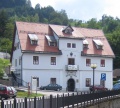Difference between revisions of "Category:UNESCO World Heritage Sites in Slovenia"
Anže Zorman (talk | contribs) |
Anže Zorman (talk | contribs) |
||
| Line 1: | Line 1: | ||
| − | In [[established::1986]] the [[Škocjan Caves World Heritage Site|Škocjan Caves]] became the first Slovene landmark inscribed onto a UNESCO World Heritage Site list. The remains of two prehistoric pile-dwellings from the Ljubljansko Barje marshlands are a part of transnational heritage site "Prehistoric Pile-Dwellings in the Alpine Area", which comprises a selection of 111 archaeological sites in six countries around the Alps | + | In [[established::1986]] the [[Škocjan Caves World Heritage Site|Škocjan Caves]] became the first Slovene landmark inscribed onto a UNESCO World Heritage Site list. The remains of two prehistoric pile-dwellings from the Ljubljansko Barje marshlands are a part of transnational heritage site "Prehistoric Pile-Dwellings in the Alpine Area", which comprises a selection of 111 archaeological sites in six countries around the Alps and was accepted in 2011. The latest addition is the [[Idrija Mine Museum#UNESCO World Heritage List|Heritage of Mercury. Almadén and Idrija]], listed in 2012. |
| − | + | UNESCO’s Tentative List, which is a required stage of the nomination process, currently has six Slovenian entries – Classical Karst since 1994 and 2015, the Fužina Hills in Bohinj since 1994, the [[Franja Partisan Hospital]] since 2000 (European Heritage Label 2015), the beech forests since 2015, the architecture of [[:Category:Plečnik heritage|Jože Plečnik]] in Ljubljana and Prague since 2015 and [[Walk of Peace in the Soča Region Foundation|The Walk of Peace from the Alps to the Adriatic – Heritage of the First World War]], in February 2016. | |
| − | |||
| − | |||
| − | |||
| − | |||
Revision as of 15:15, 23 March 2016
In 1986 the Škocjan Caves became the first Slovene landmark inscribed onto a UNESCO World Heritage Site list. The remains of two prehistoric pile-dwellings from the Ljubljansko Barje marshlands are a part of transnational heritage site "Prehistoric Pile-Dwellings in the Alpine Area", which comprises a selection of 111 archaeological sites in six countries around the Alps and was accepted in 2011. The latest addition is the Heritage of Mercury. Almadén and Idrija, listed in 2012.
UNESCO’s Tentative List, which is a required stage of the nomination process, currently has six Slovenian entries – Classical Karst since 1994 and 2015, the Fužina Hills in Bohinj since 1994, the Franja Partisan Hospital since 2000 (European Heritage Label 2015), the beech forests since 2015, the architecture of Jože Plečnik in Ljubljana and Prague since 2015 and The Walk of Peace from the Alps to the Adriatic – Heritage of the First World War, in February 2016.
Articles in category "UNESCO World Heritage Sites in Slovenia"
The following 11 pages are in this category, out of 11 total.
Media in category "UNESCO World Heritage Sites in Slovenia"
The following 17 files are in this category, out of 17 total.
- Franja Partisan Hospital 2010 Interior of doctors' room.jpg 2,448 × 3,264; 1.95 MB
- Franja Partisan Hospital 2010 Operating room.jpg 3,264 × 2,448; 1.9 MB
- Franja Partisan Hospital 2015 barracs Photo Luka Kalan.jpg 1,920 × 1,305; 2.02 MB
- Idrija Mine Museum 2006 entrance.jpg 1,299 × 1,173; 218 KB
- Miner's House Idrija 2007 fireplace.JPG 2,048 × 1,536; 395 KB
- Municipality of Idrija 1689 Valvasor.jpg 955 × 768; 187 KB
- Plecnik Collection 2015 reception room Photo Matevz Paternoster.jpg 2,500 × 1,875; 1.42 MB
- Plecnik House 1923 Karunova Ljubljana architectural design.jpg 7,036 × 3,181; 5.66 MB
- Plecnik House 2015 entry porch Photo Matevz Paternoster.jpg 2,500 × 1,875; 1.44 MB
- Plecnik House 2015 exterior Photo Andrej Peunik.jpg 2,000 × 1,333; 2.93 MB
- Plecnik House 2015 interior Photo Matevz Paternoster.jpg 2,500 × 1,875; 1.04 MB
- Plecnik House 2015 renovated studio Photo Matevz Paternoster.jpg 2,500 × 1,875; 1.3 MB
- Triglav National Park 2014 Kluze Fortress 01.jpg 5,472 × 3,648; 10.39 MB
- Walk of peace 2006 Italian charnel house above Kobarid Photo Zeljko Cimpric.jpg 5,266 × 3,547; 3.08 MB
- Walk of Peace 2006 Outdoor museum Kolovrat Photo Zeljko Cimpric.JPG 3,264 × 2,448; 5.09 MB
- Walk of Peace 2011 Monfalcone Parco tematico della Grande Guerra.jpg 3,264 × 2,448; 3.08 MB



















